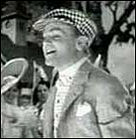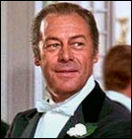There is nothing on the face of this earth as 100% unreliable as a Harry Knowles effusion about a movie he’s been privately shown by some chummy, back-rubbing distributor. His early-bird Sweeney Todd review is therefore totally theoretically dismissable because everyone knows it might well be another Armageddon ejaculation. I love Harry personally, but he’s shown time and again that he’s too emotional and too susceptible to be trusted out of the gate.



Johnny Depp, James Cagney, Rex Harrison — the three most famous sing-talkers in Hollywood history
That said, he’s calling Sweeney Todd “Tim Burton‘s best film since Ed Wood — which I consider to be his very best film to date. That said, upon multiple viewings it is possible this film will become my favorite Burton film.
He’s also calling it “a hybrid of Disney and Bava and Corman.” Mario Bava? Jesus H. Christ…that’s it as far as the Academy is concerned. Bava is an acquired taste (ivory-tower elitists like Dave Kehr are among the celebrators) but Academy squares aren’t sophisticated enough — the Bava thing goes right over their heads, or under them.
“In structure [Todd] is a sweeping love story between a young innocent man and a caged would-be Repunzel…but then there’s that rare character that you never see in a Disney fantasy musical. A bitter psychopathic father figure that is out to revenge the horror of his own life.” [Note: it’s actually spelled Rapunzel — Knowles should have spell-checked.]
“I would call this Tim Burton’s Grimmest Fairy Tale….a delicious Grand Guignol tale that is, simply irresistible. And as a work of film, set to Sondheim’s songs it is very much the great dark musical-fantasy horror work.”
The most interesting part of the essay is Knowles warning readers that Todd is “almost entirely a singing film” but not really. To hear it from Knowles, Johny Depp (who plays Sweeney) doesn’t really sing as much as channel Rex Harrison in My Fair Lady and James Cagney in Yankee Doodle Dandy by half-grooving and half-posturing with “that form of dialogue known as sing-talking.”
